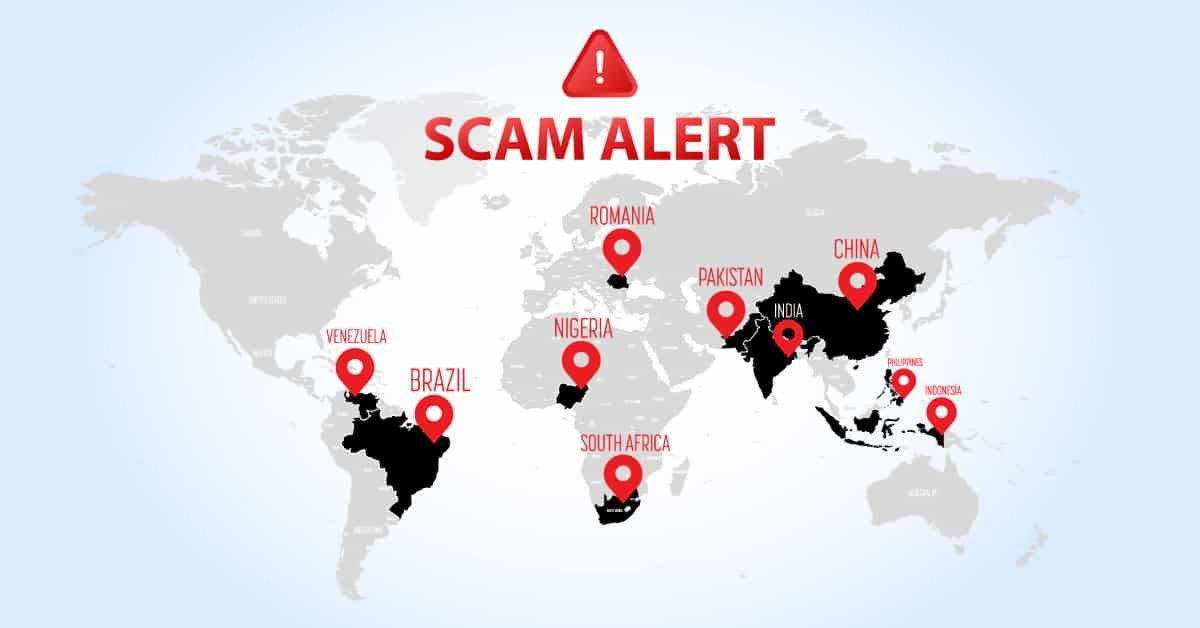Top 10 Most Common Phone Scams That You Should Be Aware
| Table of Contents |
Check out the most common phone scams below. Remember, scammers are persistent and creative. Stay informed, protect your personal information, and help others stay safe too!
 |
| What Are Most Common Phone Scams You Should Be Aware Of? |
What Are the Most Common Phone Scams Today?
1. Cryptocurrency and QR code
Here's how the scam works: This scam can take several forms, including a government impostor, a romance scam, a fraudulent utility firm, and others. Whatever their story, they will beg for money—in cryptocurrencies. The scammer will stay on the phone with you while you visit a crypto ATM, where you can buy cryptocurrency with cash or credit.
The scammer will then email you a QR code, which is a type of barcode that can be read on your phone. The QR code they offer you contains their digital address; scanning the code transmits your cryptocurrency to them, and you lose your money. This is only one type of cryptocurrency scam; there are thousands more.
| Avoid sending money to people you don't know or haven't met in person. Crypto is appealing to scammers since it allows for fast fund transfers with no method to recover your money. Always be alert when someone asks for bitcoin payment, and think twice before transferring any type of payment to someone requesting money. |
2. Bank Calls
Here's how the scam works: The IRS will never call, but your bank may, making it more difficult to determine whether it's legitimate. Furthermore, it makes natural that your bank would require your identity to safeguard your account. If your bank calls and asks you to confirm that transactions are legitimate, you can say yes or no.
However, Adam Levin, founder of global identity protection and data risk services firm CyberScout and author of Swiped: How to Protect Yourself in a World Full of Scammers, Phishers, and Identity Thieves, advises against disclosing any additional information.
According to him, some scammers may rattle off your credit card number and expiration date before asking for your security code as confirmation. Others will claim they froze your credit card because you may be a fraud victim, and then want your Social Security information.
| To avoid it, only provide that information if you made the call—do not simply provide the number that contacted you. "Flip your credit card or debit card over, look at the number, call customer service and ask if you guys just called me," Levin advises. "They have on the computer if they did or didn't." Learn more about how to permanently stop receiving spam calls. |
READ MORE: Top 15 Common Tourist Scams In The World Today
3. Virtual kidnapping
Here's how the scam works: A call from a kidnapper who claims to have a loved one is terrifying, but remain cool. It sounds heartless, but don't rush to pay the ransom, even if you hear screaming. It could be a scammer exploiting your worry. First, try to reach your loved one, who will hopefully answer the phone. Be very wary if the "kidnapper" tries to keep you on the line to ensure you have the money.
| How to avoid it: "The rule of thumb for kidnappers is to get off the phone as soon as possible," explains Levin. "Anyone who wants to stay on the phone with you through the process is not a kidnapper—they're a scammer." Before panicking, contact your loved one and anyone else who may know where they are, and inform them that you have received this phone call. If you have an iPhone, find out which iPhone privacy settings you should check right away. |
4. Request for Personal Information
Any text message that requests sensitive personal information such as Social Security numbers, bank account details, passwords, or other personal information is most likely a phishing scam. Legitimate companies and organizations never request such information by SMS.
Text messages with implausible offers, such as exceptionally low pricing on high-value items, are frequently used to entice you into a fraud. Scammers utilize these too-good-to-be-true offers to obtain personal information or financial information.
5. Nanny or caregiver?
Here's how the scam works: If you are a nanny or caretaker, you might advertise your services on an internet job board. While this is an excellent way to obtain work, it may also expose you to frauds. One phone scam involves sending you an employment offer. The "employer" sends you a check and requests that you send them some money to purchase assistive care goods required for the work.
However, just like a romance scam, the person you're speaking with isn't genuinely interested in you. After you send the money, the check will bounce, and the "employer" will vanish. Not only do you not have a job, but you also sent money to a fraudster and will not be refunded.
How to Avoid It: Verify all job offers. Does the employer have a reliable online presence, or can you find no information about them? Always check that a check has cleared before spending any money, and never send money to an employer before you begin working there. Consider this: if they can't afford the equipment, how will they pay you?
6. Lucky winner
Here's how the scam works: Congratulations, you have won a million dollars! If something seems too good to be true, it probably is. That big cash reward or amazing vacation sounds too good to pass up, but legitimate contests only enter you if you ask. "In a legitimate lottery or sweepstakes, you have to enter the contest somehow," Velasquez states. "If you ever 'win' a prize that you didn't enter—especially one with a prize worth millions of dollars—you're probably being scammed."
How to avoid it: Even if you did enter the lottery, do not believe a phony tax collector. According to Velasquez, you will eventually have to pay taxes on your gains, but not before you receive them. Don't give out any personal information to anyone saying you won something you didn't enter, and never send "taxes" or other money to anyone before receiving payment. Also, don't fall for this four-word phone hoax.
7. Insurance, healthcare, and debt scams
These con artists target vulnerable people by proposing fraudulent insurance policies, medical treatments, or debt relief programs. Use caution while discussing sensitive material over the phone.
Website password requests: Scammers may phone pretending to be from a website or service provider and stating there is a problem with your account. They ask for your password or other critical information.
8. Jury eligibility
How the scam works: Some scammers claim to be from the jury commission. When they ask for your Social Security number to establish your eligibility for jury duty, do not give them any information. "When it's from an organization that sounds authentic, people tend to give it up," Levin adds. "You cannot give it up. You must covet the information."
How to Avoid It: Never give out your Social Security number over the telephone. If you're called about jury service, search for an official letter rather than trusting anyone who calls and requests confidential information. Keep an eye out for the most frequent methods that scam artists try to gain your trust.
9. Family members in peril
Scammers pose as a distressed family member (typically a grandchild) and demand money right away. Always check such inquiries independently before providing any monies.
10. Fake Charity Appeals
Scammers exploit generosity, pretending to represent charities. They request donations over the phone, but the money doesn’t benefit any legitimate cause.
Be aware of those phrases if someone talks to you
 |
Avoid statements like "You have won a free vacation!" when speaking with someone
It's exhilarating to envision trips to sandy beaches and sunny sky, especially if they're free. However, these deals are frequently too good to be true. Furthermore, they may result in phishing efforts or hidden fees. This phrase is a classic scam bait and should immediately put you on high alert. Always disregard such statements and report any strange numbers to consumer protection agencies.
"There's a problem with your payment."
This slogan plays on your fear of financial disaster. Scammers understand that customers would go to any length to avoid paying more fees and disrupting service. They utilize this remark to catch you off guard, causing you to worry and furnish them with payment details.
Rather giving revealing your account information, first verify the truth of their statements. Always confirm any payment concerns by checking into your account or phoning customer support directly. These precautions may keep you from squandering time and money.
"You owe taxes and must pay immediately."
This scam becomes increasingly prevalent around tax season, capitalizing on people's strong fear of owing money to the government. Taxes cause concern for the majority of citizens, and scammers take advantage of this. Remember that the IRS communicates via letters, not unexpected phone calls. You may always protect your finances by verifying any tax claims directly through appropriate IRS methods.
"Can you hear me?"
This appears to be a harmless question, right? Unfortunately, it isn't. It allows criminals to record your voice saying "Yes," which they can then use to authorize false charges. When you hear this question, hang up immediately. Then, review your accounts and statements for any fraudulent activity.
READ MORE: 15 Pocket Tips to Avoid Tourist Scams in Europe Today
What can we do to avoid telephone scams?
To avoid phone frauds, take the following steps:
Block unsolicited calls and filter spam text messages
Consider adding your phone number to the FTC's National Do Not Call Registry. While it does not prevent all spam calls, it makes it easier to detect them because most real telemarketers avoid contacting registered numbers1.
Be cautious with personal information
Do not provide personal or financial information in response to unexpected demands. Honest firms will not phone, email, or text you to request sensitive information such as your Social Security number, bank account number, or credit card number.
If you receive an email or text message from a company you do business with, avoid clicking on any links. Instead, go directly to their website or search for their phone number.
Resist Immediate Pressure
Scammers may pressure you to respond quickly. Do not fall for it. Honest businesses will allow you to make decisions.
If you are on the phone with a suspected scammer, do not hesitate to hang up and assess the situation.
Conclusion
Remember that the greatest defense against these calls is to ignore them. While some people enjoy to waste a scammer's time by prolonging the discussion, it's best to hang up right away. Seniors may be more trusting on the phone, so talk to older loved ones about frequent phone scams1. Stay careful to avoid falling prey to these unscrupulous tactics!
 Scam Alert: How to Spot and Avoid Dubious Essay Writing Services Scam Alert: How to Spot and Avoid Dubious Essay Writing Services Don't fall victim to essay writing service scams. Learn how to identify and avoid dubious providers with these expert tips. |
 Simple Ways To Spot and Avoid Gas Station Pump Switching Scams Simple Ways To Spot and Avoid Gas Station Pump Switching Scams Have you ever experienced pump switching scam at gas stations? If you haven't, knowing how to avoid is never too late. |
 Have You Ever Scammed in the US? Check 30 Biggest Tourist Traps to Avoid Have You Ever Scammed in the US? Check 30 Biggest Tourist Traps to Avoid As a tourist, have you ever been scammed? Tourist traps are everywhere in the world, even in the most famous and prestigious places in the ... |


























